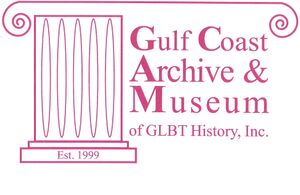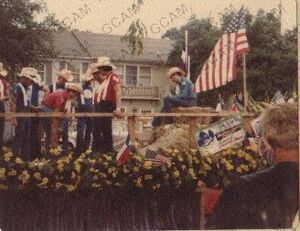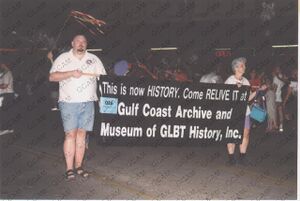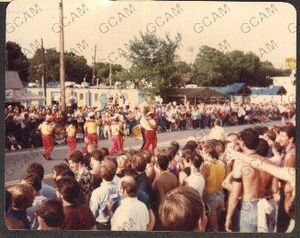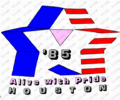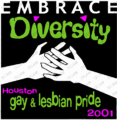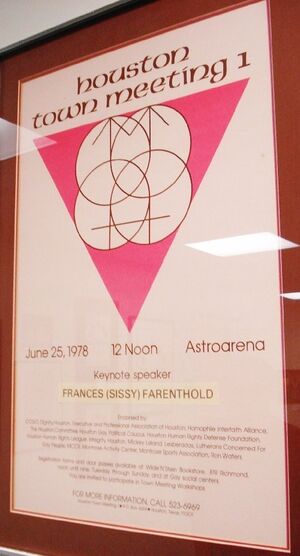Difference between revisions of "History in Houston, 40 Years after Stonewall"
| Line 50: | Line 50: | ||
| − | + | [[Image:TownMeeting1.jpg|thumb|left|]] | |
| − | Another similarly powerful moment is captured in records from the '''1977 National Organization of Women''' convention, when lesbians campaigned for visibility in the organization through a dramatic release of colored balloons during the meeting in the Astrodome. | + | This momentum started in 1977 led to one of our most signifant GLBT movements, '''Town Hall Meeting 1'''. |
| + | |||
| + | The picture shown here is a from the June 25, 1978 meeting at the Astroarena. | ||
| + | |||
| + | What had started as a simple protest had now developed into a community voice. Houston's GLBT community was outraged! We had seen Stonewall and now it was our turn to speak out also. | ||
| + | |||
| + | Another similarly powerful moment is captured in records from the '''1977 National Organization of Women''' convention, when lesbians campaigned for visibility in the organization through a dramatic release of colored balloons during the meeting in the Astrodome. | ||
In 1984 the Klu Klux Klan staged a march on Montrose, Houston's gay community. Although terror might have been expected to grip the residents of Montrose, once again they stood strong. With the help of the police department the 15 minute march ended with no casualties. | In 1984 the Klu Klux Klan staged a march on Montrose, Houston's gay community. Although terror might have been expected to grip the residents of Montrose, once again they stood strong. With the help of the police department the 15 minute march ended with no casualties. | ||
Revision as of 22:59, 21 July 2009
THIS SITE IS UNDER CONSTRUCTION
How did we get here? A major building block in the GLBT History of Houston began in response to the "singing orange juice lady", Anita Bryant.
CLICK HERE TO LISTEN TO ANITA SING!
In 1977 Anita Bryant was to appear in Houston, Texas for a singing engagement. Having previously demonstrated her disapproval of homosexuals,
thousands of protestors took to the streets and began a march which has grown into what is now Houston's Pride Parade.
What began as a small unrehearsed march in Downtown Houston has resulted in one of the largest Pride celebrations in the United States. Each year Houston's pride festival brings with it a new theme. One of the most visible displays of this theme is the posters, t-shirts and flyers that are distributed throughout the city. Some of these flyers are listed below:
- Houston Pride
This momentum started in 1977 led to one of our most signifant GLBT movements, Town Hall Meeting 1.
The picture shown here is a from the June 25, 1978 meeting at the Astroarena.
What had started as a simple protest had now developed into a community voice. Houston's GLBT community was outraged! We had seen Stonewall and now it was our turn to speak out also.
Another similarly powerful moment is captured in records from the 1977 National Organization of Women convention, when lesbians campaigned for visibility in the organization through a dramatic release of colored balloons during the meeting in the Astrodome.
In 1984 the Klu Klux Klan staged a march on Montrose, Houston's gay community. Although terror might have been expected to grip the residents of Montrose, once again they stood strong. With the help of the police department the 15 minute march ended with no casualties.
Fueled by the power of Stonewall, Houston's GLBT community could no longer be silent!
In 1985, Mayor Louis Welch, who while running for re-election, made a famous gaffe by saying inadvertently on microphone that his solution to HIV would be to “shoot the queers.” Once again the GLBT community of Houston spoke out. T-shirt were made with the caption' "Don't shoot me Louie!"
